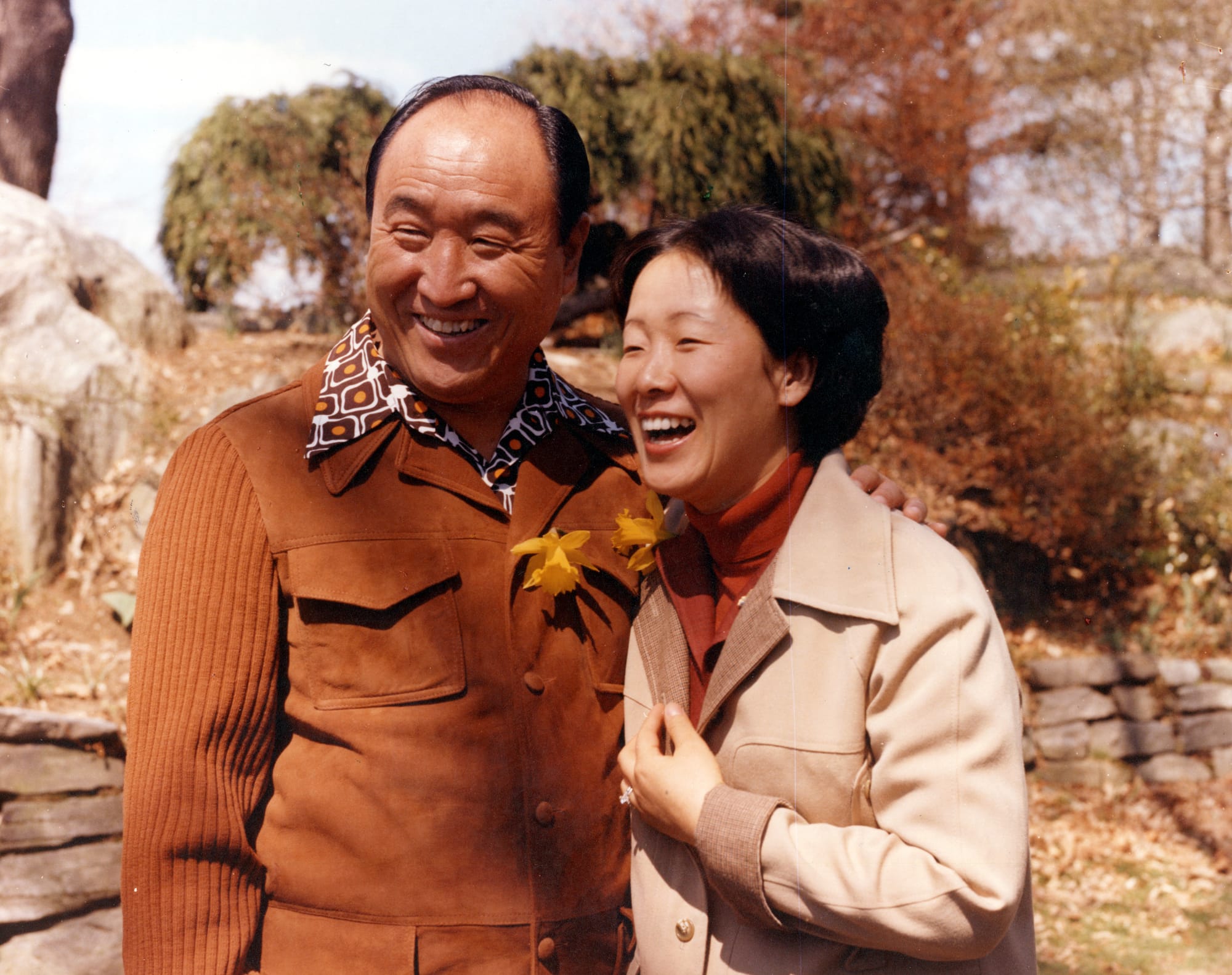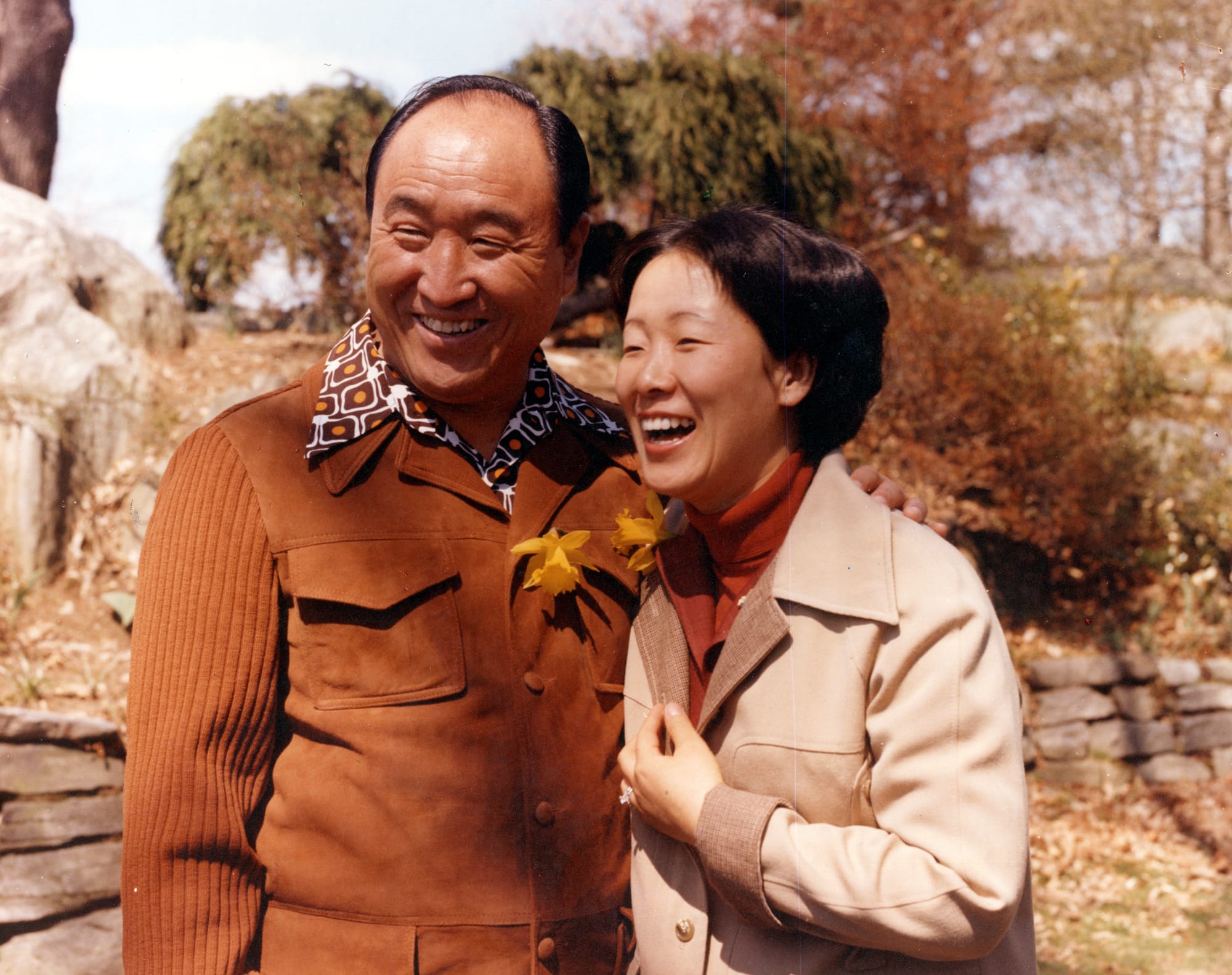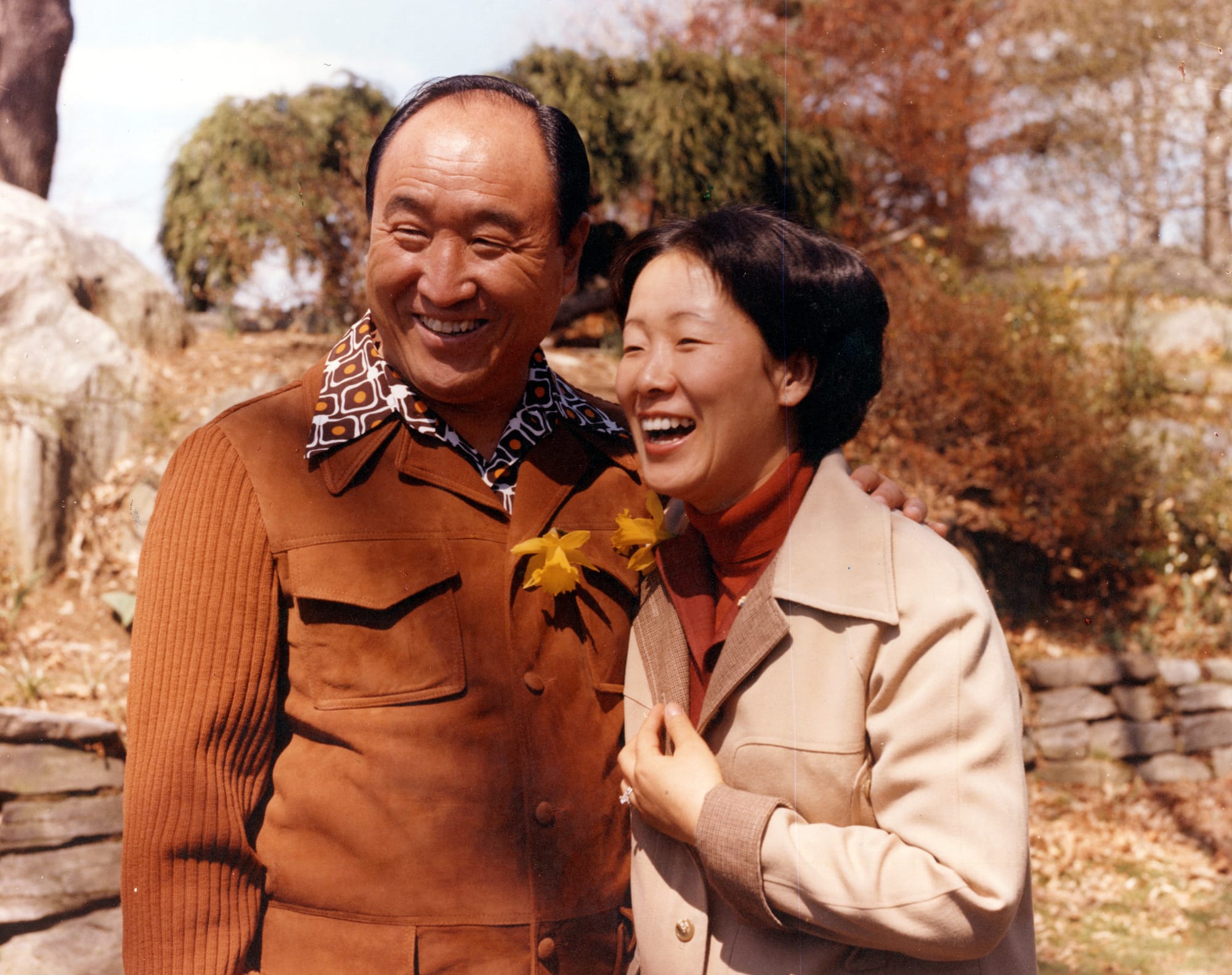Father Moon honors Shakyamuni as the greatest saint of Asia. His life is a model for anyone who leaves family and friends behind in the search for truth.
He was also persecuted during his ministry for attracting young people who abandoned their families, wives, children, and wealth to become monks and nuns and follow the path to enlightenment.
That blissful state, experienced by the Buddha and many Buddhists since, brought him to the summit of the universe. Everyone would do well to emulate his spiritual practice and find that state.

The Buddha Rejects the World in Search of the Path to Truth
Although his parents were unwilling and tears poured down their cheeks, the recluse Gotama, having cut off hair and beard and donned saffron robes, went forth from home into homelessness. Digha Nikaya 1.115
The king of the Shakya, having heard from the sage Asita that the goal of the prince was to attain supreme bliss, sought to engage the prince in sensual pleasures, lest he should wish to go off to the forest… He ordered that all commoners suffering any affliction should be kept off the royal road lest the tender-hearted prince be distressed at the sight of them… Yet on one excursion, the prince saw the man overcome with old age, different in form from other people, and his curiosity was aroused. “Oh, charioteer! Who is this man with gray hair, supported by a staff in his hand, his eyes sunken under his eyebrows, his limbs feeble and bent? Is this transformation a natural state or an accident?” The charioteer, when he was thus asked, his intelligence being confused by the gods, saw no harm in telling the prince its significance, which should have been discreetly withheld from him, “Old age, it is called, the destroyer of beauty and vigor, the source of sorrow, the depriver of pleasures, the slayer of memories, the enemy of sense organs. That man has been ruined by old age. He, too, in his infancy had taken milk and, in due time, had crawled on the ground; he then became a handsome youth, and now he has reached old age…” For a long while, the prince kept his gaze on the decrepit man, sighing and shaking his head. “Turn back the horses, charioteer; go home quickly. How can I enjoy myself in the garden when the fear of death is revolving in my mind?” [On a second excursion, the prince is similarly distressed at the sight of a man afflicted by disease. On a third excursion, he sees a corpse carried by mourners.] The charioteer then said to him, “This is the last state of all men. Death is certain for all, whether they be of low, middle, or high degree.” Though he was a steadfast man, the prince felt faint as soon as he heard about death. Leaning his shoulders against the railing, he said in a sad tone, “This is the inescapable end for all men; yet, people in the world harbor no fear and seem unconcerned. Men must be hardened indeed to be so at ease as they walk down the road leading to the next life. Charioteer, turn back, for this is not the time for the pleasure-ground. How can a man of intelligence, aware of death, enjoy himself in this fateful hour?”… Longing for solitude, the prince kept his followers back and approached a lonely spot at the foot of a Jambu tree, covered all over with beautiful leaves. There he sat on the clean ground where the soft grass glittered like beryl. Contemplating the birth and death of beings, he undertook to steady his mind in meditation. In no time his mind became firm; he was released from mental distractions such as the desire for objects of sense, and attained the first trance of calmness. Having acquired the concentration of mind which springs from solitude, the prince was filled with extreme joy and bliss; then meditating on the course of the world, he thought, “Alas, wretched is he who, out of ignorance and the blindness of pride, ignores others who are distressed by old age, sickness, or death, though he himself, being likewise subject to disease, old age, and death, is helpless!”… The prince now knew what he should do, and began thinking of a way to leave his home. Ashvaghosha, Buddhacarita 3-5
Now at that time very distinguished young men belonging to the respectable families in Magadha were living the holy life under the Lord. People looked down upon, criticized, spread it about, saying, “The recluse Gotama gets along by mak- ing [us] childless, the recluse Gotama gets along by making [us] widows, the recluse Gotama gets along by breaking up families… Who now will be led away by him?” Vinaya Pitaka 1.43
At one time Shakyamuni Buddha was staying in the town of Kausambi. In this town there was one who resented him and who bribed wicked men to circulate false stories about him. Under these circumstances, it was difficult for his disciples to get sufficient food from their begging, and there was much abuse. Ananda said to Shakyamuni, “We had better not stay in a town like this. There are other and better towns to go to. We had better leave this town.” The Blessed One replied, “Suppose the next town is like this, what shall we do then?” “Then we move to another.” The Blessed One said, “No, Ananda, there will be no end in that way. We had better remain here and bear the abuse patiently until it ceases, and then we move to another place. There are profit and loss, slander and honor, praise and abuse, suffering and pleasure in this world; the Enlightened One is not controlled by these external things; they will cease as quickly as they come.” Dhammapada Commentary
Teachings of Sun Myung Moon
Shakyamuni entered the religious life in search of the true path. Leaving the palace behind, he journeyed as a solitary monk, overcoming many obstacles. He searched for a way for human beings to live according to the Way of Heaven, the Universal Law, which God sought to establish in the world.
Yet when he set out on his journey, a sea of tears blocked his way—tears from individuals, tears from his family, and tears from his countrymen. Surely the saintly Shakyamuni, who had to overcome all this, walked a most miserable path.34 (101:151, October 29, 1978)
The passing joys of those who delight in the pleasures of the flesh are nothing compared to the bliss experienced by those on the path of enlightenment, who find joy amid simple poverty.
Gautama Buddha, who abandoned the luxuries of the royal palace and became enraptured in the pursuit of the Way, was not the only one who wandered about homeless while searching for his heart’s resting place, though he knew not where it was. (Exposition of the Divine Principle, Introduction)
Buddha was persecuted by members of the royal family because he gave up his position as the crown prince. People persecuted him in a country where royalty was worshipped. (258:87, March 17, 1994)
Shakyamuni of India was born as a prince of his country, but when he came to understand that life was a “sea of bitterness,” he gave up his position as a prince to search for the path of truth.
Buddhism originated in India, but today there are not many Buddhists in India. There has never been a religious founder who was received well in his own country. No nation has treated its saints well during their lifetime. (39:255-56, January 15, 1971)

The Buddha’s Enlightenment
Having mastered perfectly all the methods of trance, the prince recalled, in the first watch of the night, the sequence of his former births. Next the Rightly illumined One perceived, and thus was decisively awakened: When birth is destroyed, old age, and death cease; when becoming is destroyed, then birth ceases; when attachment is destroyed, becoming ceases; when craving is destroyed, attachment ceases…35
Reflecting his right understanding, the great hermit arose before the world as Buddha, the Enlightened One. He found self nowhere, as the fire whose fuel has been exhausted. Then he conceived the Eightfold Path, the straightest and safest path for the attainment of this end. For seven days, the Buddha with a serene mind contemplated the Truth that he had attained and gazed at the Bodhi tree without blinking: “Here on this spot I have fulfilled my cherished goal; I now rest at ease in the Dharma of selflessness.” Ashvaghosha, Buddhacarita 14
Through many a birth I wandered in samsara, seeking but not finding the builder of this house. Sorrowful is it to be born again and again. O house-builder! You are seen. You shall build no house again.
All your rafters are broken. Your ridgepole is shattered. My mind has attained the unconditioned. Achieved is the end of craving. Dhammapada 153-54
In heaven and on earth, I alone am the honored one.36 Digha Nikaya 2.15
Know then, that from time to time a Tathagata is born into the world, a fully Enlightened One, blessed and worthy, abounding in wisdom and goodness, happy with the knowledge of the worlds, unsurpassed as a guide to erring mortals, a teacher of gods and men, a blessed Buddha. He thoroughly understands this universe, as though he saw it face to face… The Truth does he proclaim both in its letter and in its spirit, lovely in its origin, lovely in its progress, lovely in its consummation. A higher life does he make known in all its purity and in all its perfection. Digha Nikaya 13, Tevigga Sutta
Teachings of Sun Myung Moon
If you establish yourself at a true perpendicular angle [to Heaven] and resonate with the true love of the universe, you will become one with God’s love both internally and externally.
Then the universe will belong to you, you will become a great person, and everything will be under your dominion. Shakyamuni experienced this state and said, “In heaven and on earth, I alone am the honored one.” (178:299, June 12, 1988)
Shakyamuni Buddha said, “In heaven and earth, I alone am the Honored One.” In what state did he teach this? If you were to enter that state of resonance, you would become one with God.
In that state, you would be able to see thousands of years of human history unfold before your eyes. You would experience yourself as having that incredible value.
How can we humans escape from the painful cycle of suffering, life after life?
How can we escape from our miserable life’s destiny that ends in the cemetery? This is the homework given to each of us. To solve this, we have to receive training to enter the realm of resonance. (38:270-73, January 8, 1971)





